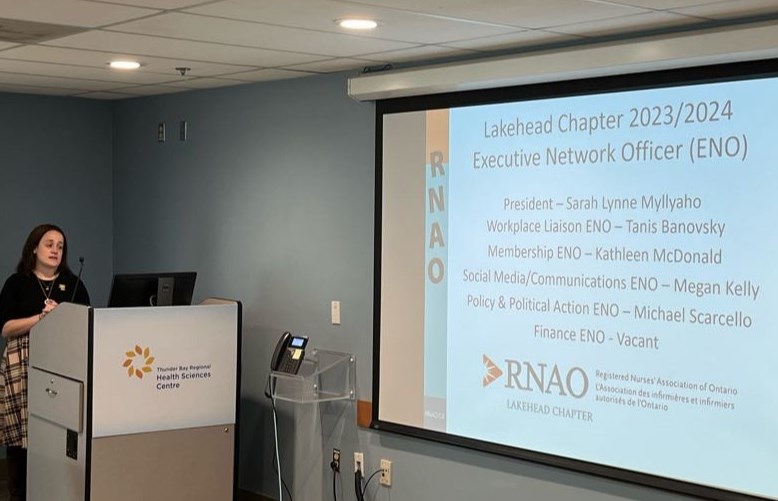THUNDER BAY — The calls continue from across Ontario to implement an increased minimum wage for registered practical nurses and improve working conditions.
The Lakehead Chapter of the Registered Nurses' Association of Ontario gathered Wednesday at the Thunder Bay Regional Health Sciences Centre to hear from their members as well as from provincial association president Claudette Holloway.
Holloway stated that her message is that the association supports their membership and they continue to advocate to the provincial government on their behalf.
“Our nurses continue to feel burnt out. They feel the biggest thing is that they [don’t] feel valued by our provincial government since we've had Bill 124 struck down. But we have a premier that continues to pursue that,” Holloway said. “Nurses are only expecting fair compensation, fair and equitable workloads which don’t stress them out [as well as the opportunity to] develop their career here in Ontario.”
In July, arbitrator William Kaplan stepped into failed talks between the Ontario Hospital Association and the Ontario Nurses Association and awarded raises that average 11 per cent over two years.
The Progressive Conservatives introduced Bill 124 in 2019 to cap the wage increases of Ontario Public Service employees at one percent.
An Ontario court found Bill 124 unconstitutional late last year, but the government decided to appeal that decision.
Holloway went onto say that the progress the province does make for nurses should be acknowledged, but those are just baby steps.
“[We still have] a significant number [of nurses] that have chosen to leave the province as well as the profession,” Holloway said. “It’s because of compensation, and they could not manage their workloads and couldn’t get the time off. [We want to see strategies brought in] where [the staff] can have support. We also want our provincial government to stop advancing [and] investigating health care where nurses are going to agencies. We're not blaming the nurses, they're trying to make a fair wage, but it's actually just draining our health care system further and making it poorer.”
In May, a poll of nurses in Ontario showed more than 60 per cent were prepared to leave the profession.
Lakehead Chapter president Sarah Lynne Myllyaho was happy to see the province roll out Community Commitment Program for Nurses, even though it was a way to skirt around the fact that there is still a shortage of nurses.
“How are we [going to retain] the workforce that we have now?” she asked metaphorically. “If you don't have those seasoned experienced nurses to mentor these new nurses coming in, that is sort of all for not [and] you still can't retain those new ones that you get. So, it's not only [about] increasing the number of seats, [it’s also about figuring] out a retention plan to keep those and experienced nurses at the bedside to mentor those new nurses.”
The program provides $25,000 in grant funding to eligible nurses in exchange for a two-year commitment to an eligible employer.
Myllyaho noted that new nurses are looking for a better work-life balance.
“A lot of the nursing students that are coming in want part time [or] casual to be able to accommodate their lifestyles, which is more of a challenge. We are lucky to have the CCPN program, which has the stipulation that [nurses have] to have full time. We are seeing a great increase right now where we've hired all those new graduate nurses in two years, full time. But then after those two years, they may not want to stay full time.”
The Lakehead Chapter of the association has recently re-established itself and re-engaged with members, and had an initial meeting with the Executive Network Officer team last month.
Myllyaho said that the goal is to have a presence not only in the community, but also on social media platforms and further engage with the membership to find out what they would like to see in terms of events, activities, education opportunities and professional development opportunities.
